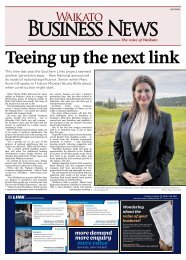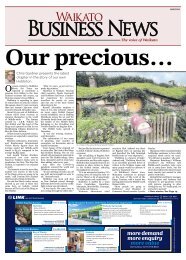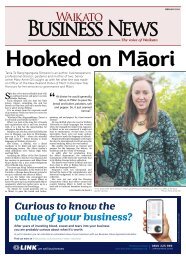Waikato Business News August/September 2020
Waikato Business News has for a quarter of a century been the voice of the region’s business community, a business community with a very real commitment to innovation and an ethos of co-operation.
Waikato Business News has for a quarter of a century been the voice of the region’s business community, a business community with a very real commitment to innovation and an ethos of co-operation.
Create successful ePaper yourself
Turn your PDF publications into a flip-book with our unique Google optimized e-Paper software.
6 WAIKATO BUSINESS NEWS <strong>August</strong>/<strong>September</strong> <strong>2020</strong><br />
Firms frustrated as migrant workers<br />
stuck in limbo<br />
By RICHARD WALKER<br />
Frustrated <strong>Waikato</strong> business owners say<br />
opportunities are slipping away and staff<br />
are under huge emotional strain because<br />
of Immigration New Zealand’s opaque<br />
communication and slow response to<br />
applications.<br />
They say rules keep<br />
changing and appear<br />
unfriendly to small<br />
businesses, which face a compliance<br />
burden every time they<br />
support a worker for a visa or<br />
residence application.<br />
Rocketspark co-founder<br />
Jeremy Johnson complained<br />
to Immigration NZ after a<br />
key staffer had her application<br />
for residency stalled in the<br />
bureaucracy for 17 months -<br />
after which time she is yet to<br />
be assigned a case manager.<br />
Meanwhile, Automatic<br />
Door Services director Andy<br />
Marsden has gone around<br />
the agencies in a desperate<br />
attempt to get an exemption<br />
for a skilled staff member<br />
stuck in India during Covid-19<br />
restrictions.<br />
Cambridge-based immigration<br />
adviser Matthew Gibbons<br />
says residence applications,<br />
apart from a very small category<br />
of people, are taking about<br />
18 months or more to get a case<br />
officer allocated.<br />
“That is a significant<br />
increase from what we were<br />
seeing a couple of years ago.<br />
So it is causing a lot of distress<br />
for people.”<br />
Gibbons is on an industry<br />
steering group formed during<br />
Covid-19 by key players in<br />
the area - the Auckland District<br />
and New Zealand law<br />
societies, the NZ Association<br />
for Migration and Investment,<br />
and the NZ Association for<br />
Immigration Professionals.<br />
The group is pushing<br />
on several fronts, including<br />
Andy Marsden<br />
seeking greater clarity around<br />
the exception pathway and<br />
lobbying to see processing<br />
times come down.<br />
They have also met with<br />
new Immigration Minister<br />
Kris Faafoi about the stress,<br />
anxiety and depression faced<br />
by some migrants. “We want<br />
to try and get some communications<br />
from Government<br />
and from Immigration New<br />
Zealand to migrants to at least<br />
give them some signposting,<br />
some clarity as to what is or is<br />
not going to be happening any<br />
time soon.”<br />
Faafoi appeared receptive,<br />
Gibbons says.<br />
Covid-19 is making the situation<br />
worse, but Rocketspark<br />
director Grant Johnson points<br />
out customer marketing manager<br />
Fei Guo’s problems began<br />
well before the pandemic.<br />
Jeremy Johnson and Fei Guo<br />
The Cambridge-based<br />
software firm was confident<br />
she cleared the threshold to<br />
be given residency when they<br />
started the process two years<br />
ago, with the expectation of<br />
a decision within six months,<br />
based on information on Immigration<br />
NZ’s website. She had<br />
flourished at the web-building<br />
firm, after joining three years<br />
ago, and had been promoted to<br />
her current position managing<br />
a team of five.<br />
The founders say people<br />
with her skill set are difficult<br />
to attract to Cambridge, and<br />
point out her performance in<br />
the role has enabled the hiring<br />
of further New Zealand<br />
residents. She has made Cambridge<br />
home, following a short<br />
stint in Auckland after she<br />
gained a Masters in Management<br />
Studies majoring in marketing<br />
at <strong>Waikato</strong> University.<br />
She is, Grant Johnson says,<br />
“a good citizen and a good<br />
team member”. However,<br />
with no certainty, she faces<br />
the possibility of returning to<br />
China. One small win after the<br />
firm pushed her case was the<br />
recent extension of her visa<br />
from January to April, in line<br />
with a general extension made<br />
by the government.<br />
Fei says the rules have<br />
changed while she has been<br />
waiting, with the introduction<br />
of a two-tier system that gives<br />
weight to high income earners.<br />
“They’ve got a non-priority<br />
queue and a priority queue<br />
now. As I understand it, they<br />
are processing the priority<br />
queue, and put the non-priority<br />
queue on hold,” Fei says.<br />
Gibbons backs her view.<br />
The only categories being processed<br />
more quickly are high<br />
income earners with salaries<br />
of $106,000 or more annually<br />
or occupations requiring occupational<br />
registration, he says.<br />
“Everything else is sitting in<br />
the queue.”<br />
Jeremy Johnson says the<br />
salaries being given preference<br />
are outside the reach of<br />
most small firms.<br />
“We’re a small business,<br />
helping small businesses and<br />
this is a major handbrake for<br />
us,” he says. “It doesn’t feel<br />
like a small-business friendly<br />
approach.”<br />
Gibbons frequently deals<br />
with people in Fei’s situation,<br />
and says they are usually<br />
successful in gaining<br />
a further temporary visa<br />
because, by definition, they are<br />
skilled migrants.<br />
“But it’s far from certain,<br />
and it’s causing a lot of anxiety<br />
and distress to people<br />
who have made plans for<br />
their long term future and find<br />
themselves in a very uncertain<br />
world whilst their residence<br />
[application] is just sitting in<br />
a queue.”<br />
And while the minister<br />
recently exercised new powers<br />
to issue a six-month extension<br />
for work visa holders, it did<br />
not apply to their family members,<br />
which Gibbons thinks<br />
was a mistake that will create<br />
more work for Immigration<br />
NZ as spouses and children<br />
apply for an extension.<br />
Marsden was able to<br />
renew one Automatic Door<br />
Services (ADS) staff member’s<br />
skilled migrant worker<br />
visa just before Covid-19<br />
hit, but says the administrative<br />
load is daunting, time<br />
consuming and costly.<br />
Even worse for Marsden,<br />
another key worker, Harwinder<br />
Singh, is stranded in<br />
India, where he had returned<br />
home for a visit, with no<br />
indication of when he might<br />
be able to return.<br />
Marsden says local MP<br />
Louise Upston has given<br />
“fantastic” support, but he is<br />
unimpressed with the government<br />
agencies he has dealt<br />
with, which include Foreign<br />
Affairs and MBIE as well as<br />
Immigration NZ.<br />
“It all comes down regularly<br />
to lack of communication,”<br />
he says “Unless you<br />
are really fortunate and have<br />
the right people on your side<br />
there is no straight line of<br />
communication with anybody<br />
at Immigration NZ -<br />
there is a blank wall.”<br />
ADS won recognition from<br />
MBIE that part of its business<br />
was essential during Covid-19<br />
level four lockdown, in recognition<br />
of its role making essential<br />
premises secure.<br />
“At this point I thought,<br />
home free, we’ve got it.”<br />
But he says when he forwarded<br />
the email to Immigration<br />
NZ in expectation<br />
of getting Singh back into<br />
New Zealand, he discovered<br />
MBIE’s acceptance<br />
made no difference.<br />
It all comes down<br />
regularly to lack<br />
of communication,<br />
unless you are really<br />
fortunate and have<br />
the right people<br />
on your side there<br />
is no straight line<br />
of communication<br />
with anybody at<br />
Immigration NZ -<br />
there is a blank wall.<br />
Marsden says Singh, who<br />
he describes as his “righthand<br />
man”, was expecting<br />
to submit his application<br />
for residency in <strong>September</strong>,<br />
and his skilled migrant work<br />
visa comes up for renewal in<br />
January. “So we’re in a bit<br />
of a worried position now,<br />
given the timeframes that<br />
we’re seeing.”<br />
Marsden says when Singh<br />
phoned Immigration NZ, he<br />
was told they could find nothing<br />
in relation to his exemption<br />
application. Marsden has<br />
even offered to pay for quarantine.<br />
“Imagine how isolating<br />
it is overseas. Everything<br />
you have has been moved to<br />
New Zealand, it’s in a house in<br />
New Zealand, you don’t even<br />
know when you can go back<br />
to that country to go and get<br />
it, let alone go back and start<br />
your life again.”<br />
Gibbons says in his experience<br />
the problem is lack of<br />
action, rather than a failure of<br />
communication. “Generally<br />
speaking if I contact Immigration<br />
New Zealand, I get a<br />
response from them but not<br />
necessarily the response I<br />
want. If I make a request for a<br />
case to be escalated so it gets<br />
processed I nearly always get<br />
a decline. Immigration introduced<br />
a system to escalate<br />
cases and it is granted only<br />
in very rare circumstances<br />
in my experience.”<br />
As for the delays, he thinks<br />
both rising demand and an<br />
Immigration NZ decision to<br />
close offshore branches are<br />
contributing factors but not<br />
the whole reason.<br />
Cambridge Chamber of<br />
Commerce chief executive<br />
Kelly Bouzaid describes the<br />
situation as a “mess”. She<br />
asks why some get approved<br />
while others don’t, after writing<br />
successfully in support of<br />
a local chef whose visa had<br />
expired. She says the first two<br />
approaches, before he was<br />
approved, involved the restaurant<br />
being told they could<br />
hire a Kiwi. “Actually here<br />
and now that’s not really the<br />
answer for business continuity<br />
in amongst a pandemic.”<br />
The toll on small firms<br />
such as ADS and Rocketspark,<br />
lacking the resources of large<br />
firms, is challenging, and<br />
is potentially holding back<br />
growth of jobs for New Zealanders<br />
as well as migrants.<br />
“When you believe you’re<br />
operating with complete integrity,<br />
and it’s the right person<br />
for the job and you’re growing<br />
the New Zealand economy,<br />
that’s when you start to<br />
get a bit testy,” Grant Johnson<br />
says. “We are pretty placid but<br />
we’re getting ticked off.<br />
“We’re pretty realistic in<br />
terms of it [Covid-19] is a<br />
one in 100 year event. But it<br />
wouldn’t be that hard to provide<br />
some clear guidance.”<br />
Gibbons: “I think throughout<br />
all of this, what we would<br />
love to see is a little bit more<br />
guidance, a little bit more<br />
signposting as to exactly what<br />
is or is not likely to happen.<br />
I do understand that these<br />
are extremely unusual times.<br />
But I do think there’s been<br />
quite a lot of time to try and<br />
work through these issues to<br />
get more policy, more planning<br />
as we move forward.<br />
And if that means giving<br />
people bad news, so be it,<br />
but at least let people know<br />
where they stand.”


















